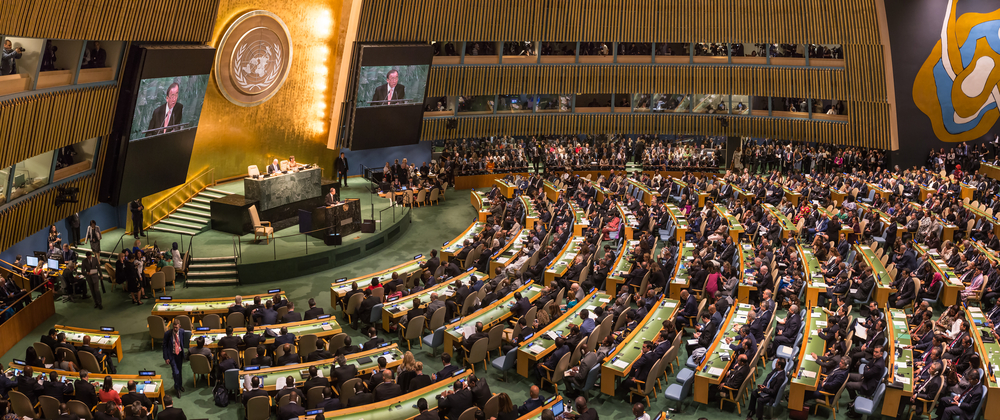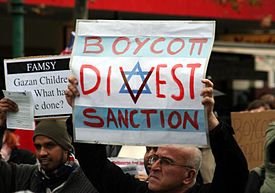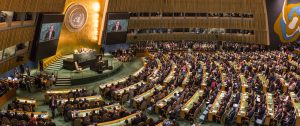(The Begin-Sadat Center For Strategic Studies, Sept 15, 2020)
EXECUTIVE SUMMARY: With the opening of the UN General Assembly on September 15, the international body will mark 75 years since its founding. The celebrations will assuredly be accompanied by extensive Western media discourse on the need for the US to return to multilateralism and rely on international institutions for “legitimacy.” However, Western progressive discourse regarding the UN and other international institutions is based upon a myth: that such institutions reflect elevated ideals, objective standards, and a genuine commitment to human rights.

The UN and many other international institutions purport to be exemplars of high ideals, objective standards, and a commitment to human rights. The reality is sadly quite different. Despite lofty mission statements, the actions and policies of such institutions reflect political horse-trading, narrow interests, and the tyranny of the majority. Nowhere is this discrepancy between discourse and reality more evident than with regard to the treatment of Israel.
In fact, the deal-making that determines votes in institutions such as the UN leads frequently to outcomes that are nothing short of absurd. Countries such as Venezuela, Libya, and China are elected to the UN Human Rights Council (UNHRC), and China chairs the UNHRC process that nominates the UN’s world monitor on free speech. One cannot make this up.
However, there is no clearer example of the abuse of the patina of international “legitimacy” for political ends than the weaponizing of global forums to wage diplomatic and legal war against Israel.
From 2006-2019, the UNHRC issued 85 condemnations of Israel. During the same period, it issued 12 condemnations of North Korea, nine of Iran, one of Venezuela, and zero of China, Qatar, Sudan, or Somalia. Israel is the only country in the world subject to a permanent item on the UNHRC’s annual agenda that is dedicated to the state’s condemnation.
The anti-Israel campaign at the UNHRC entered a new phase in February 2020 in a manner that directly threatens US companies and interests. On February 12, the UN Human Rights Commissioner, at the behest of the UNHRC, published a blacklist of companies allegedly contributing to Israeli settlements in the West Bank.
No other UNHRC blacklist (or, in UN parlance, “database”) has ever been drawn up for any other territory considered disputed or occupied anywhere else in the world. This is for the simple reason that business activity in other such territories is considered legitimate. In fact, many of the world’s largest corporations, including European multinationals, have extensive operations in areas considered by the UN to be occupied, such as northern Cyprus and Western Sahara. Only in Israel’s case did the member states of the UNHRC vote to create a blacklist targeting companies engaged in lawful activity.
This is a clear case of double standards. The most widely accepted international definition of antisemitism, that of the International Holocaust Remembrance Alliance, includes, as an example of modern antisemitism, the application of double standards to Israel alone. The IHRA has been adopted by over 25 countries and has been endorsed by others. The UN’s blacklist is thus a glaring example of modern antisemitism.
The unconscionable and even illegal discrimination endorsed by the UNHRC blacklist goes even further. Even if one were to accept the disputed claim that the West Bank should be considered “occupied,” the UN blacklist faults companies for providing services that, under international law, an “occupying power” is required to provide (such as ensuring “public order and safety” and “public health and hygiene”.)
In other cases, Israel and international companies are included on the blacklist for providing services in areas explicitly under Israeli responsibility according to signed Israeli-Palestinian agreements witnessed by the international community, such as the Oslo Accords and the Paris Protocol.
In other words, the UN is blacklisting companies for performing activities that are not only legal under international law, but are in some cases explicitly recognized or mandated by international conventions and agreements.
One of the primary sources on which the UN’s blacklist is based is Who Profits, an extreme anti-Israel NGO that serves as the research engine for the so-called Boycott, Divestment and Sanctions (BDS) campaign against Israel. Interestingly, one of Who Profits’ key funders in Medico International, a German NGO funded by the German government. It is perhaps not entirely coincidental that despite 21 German companies being reviewed by the UN in the initial stage of preparing the blacklist, none was included on the final list.
Following the blacklist’s publication, US Secretary of State Mike Pompeo condemned it, declaring:
The United States has long opposed the creation or release of this database, which was mandated by the discredited UNHRC…Its publication only confirms the unrelenting anti-Israel bias so prevalent at the UN…
Similarly, US Secretary of Commerce Wilbur Ross stated, “The UN ‘blacklist’ is anti-business, seeks to isolate Israel, has no factual basis or legal force whatsoever, and should not be adhered to in any respect.”
The clear goal of the Palestinians, the pro-Palestinian NGOs who promoted the list, and their allies on the UNHRC was to use the UN to give a stamp of legitimacy to BDS, which seeks to end Israel’s existence as a Jewish state. As Secretary Pompeo noted, this UN effort “facilitates the discriminatory BDS campaign and delegitimizes Israel.”
Another UN body whose aura of international legitimacy is regularly used to delegitimize Jewish history and heritage is the UN Educational, Scientific and Cultural Organisation (UNESCO). The organization has time and time again passed feckless resolutions that erase thousands of years of Jewish history, while singling out Israel for condemnation.
For example, an October 2016 UNESCO resolution referred to the Temple Mount in Jerusalem—the holiest site in Judaism—solely by its Islamic name (“al-Aqsa Mosque/al-Haram al-Sharif”), while intentionally omitting any reference to a Jewish connection to this site, which predates Islam by centuries. As a result of the politicization of UNESCO, both the US and Israel quit the organization in 2019.
The political nature of supposedly non-political organizations is evidenced as well by the World Health Organization (WHO), whose agenda and leadership is ultimately determined not by objective medical professionals but by its 194 member states. The WHO was widely criticized for pro-China bias in its handling of COVID-19, but its highly political nature was on display even before the global pandemic in its treatment of Israel.
At the WHO’s 2019 Assembly, out of 21 agenda items, only one, co-sponsored by the Arab bloc and the Palestinian delegation, singled out a particular country: Israel. While paying lip service to the idea that diseases know no borders, the WHO refuses to include Israel in its Eastern Mediterranean region due to the objections of Arab states. Instead, it classifies Israel as part of Europe, prioritizing political considerations over those related to public health.







